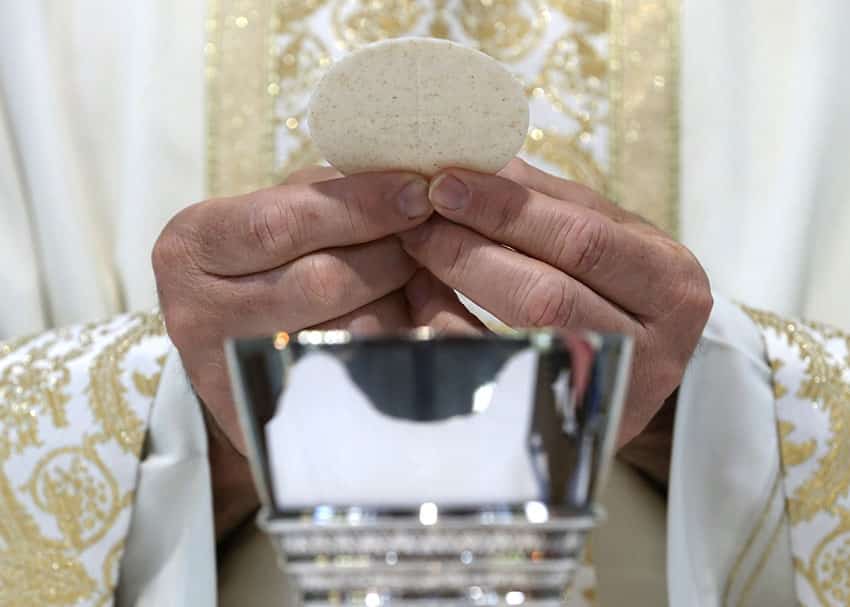Reading Time: 4 minutes

You would think that, by now, I would know how to get through the Mass. I don’t have little babies to keep me trotting up and down the aisles, and I don’t have toddlers that need to be taken to the bathroom three or four times. I have arrived: It’s finally just more or less me and the Lord. But I’m finding I’m not exactly sure what to do — especially right after I receive Him in the Eucharist.
This seems like a problem, because I know perfectly well that the Eucharist is the source and summit of Christian life. So it feels weird to receive it and then go back to my pew and not be overwhelmed. And yet I find it much easier to focus and pay attention at every other part of the Mass. Right after receiving the Eucharist, though, my mind wanders, and I find this distressing.
There are, of course, prayers for this. It’s never a bad thing to look up prayers written by someone else for a specific occasion, and you get zero points for having memorised a prayer, or for coming up with something original. But somehow I can never find the right page, or it never occurs to me to print something out ahead of time. And to be honest, I have never found one that I really like.
But I’m also not happy with my own extemporaneous prayer. Somewhere along the way, I got sidetracked, and started to feel that the miracle of transubstantiation was sort of the main attraction, and that it was this mystery that I must train all my attention and focus on.
Don’t get me wrong; transubstantiation is very cool. There’s plenty of food for thought, as it were, in the idea of Jesus using ordinary, physical food and making it into his body and blood that feeds us. But it would be a mistake to lose sight of the thing that happens whether we consume that food or not: Christ does not die again, but he does give himself to us again. He does not suffer again, but he does come to save us. Right there, at the altar, right in front of us.
The Eucharist is the source and summit of Christian life, but we don’t necessarily go to Mass to receive the Eucharist. We still have the obligation to attend Mass even if we don’t intend to receive; and while we’re there, what we witness and, to whatever extent we’re able, what we join ourselves with, is the sacrifice of the Mass. Since I was reminded of this (via a conversation on Twitter), I have found it very helpful to focus on the unbloody re-creation of the sacrifice of Jesus, rather than on my subsequent reception of it.
And it doesn’t have to be complicated. Several years ago, I got it into my head to interview one of my children on the occasion of the annunciation. I suppose if it had gone poorly — if she had claimed there were four persons of the trinity, or that the middle one was named Jeremy — I wouldn’t have saved it; but as it happens, it went well. So well that it popped into my head the other day, as I was struggling with these questions of how to arrange my heart at Mass.
Here’s the pertinent part: I asked her what day it was, and she said it was the annunciation, “when Mary was told she was having a baby”.
Me: Who told her that?
Kid: A angel.
Me: What did the angel say?
Kid: You are gonna have a baby.
Me: Who will the baby be?
Kid: Jesus.
Me: Is Jesus just a regular boy?
Kid: No.
Me: Who is he gonna be?
Kid: A ruler of the world.
Me: A ruler of the world like a president or a king?
Kid: No.
Me: How?
Kid: He made the earth, he made everything, he even made himself!
Me: Kind of! God was not made. God always was. There was never a time when there was no God, ’cause that’s what we mean when we say ‘God’: That nobody made him. So, when the angel said to Mary, ‘You’re going to have a baby,’ what did she say?
Kid: ‘But I’m not even married!’
Me: And what did the angel say?
Kid: I don’t know.
Me: The angel said, ‘Don’t worry, this baby comes from God, and God will take care of you.”
Kid: But he is God
Me: It’s confusing, huh?
Kid: I know. Maybe God had a duplicator machine.
Me: Okay. So, anyway, so what did Mary say? Did she say, ‘Heck no, I don’t want any part of that?’
Kid: No.
Me: So what did she say?
Kid: ‘Thank you.’
And really, truly, there it is. That’s the whole thing. We show up because we know Jesus is coming, and when he does, we say “Thanks.” You can elaborate on this approach, but I don’t see how you could improve on it.
The post Simcha Fisher: What to do at Mass appeared first on The Catholic Weekly.




















